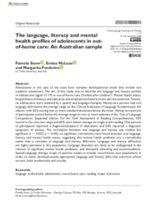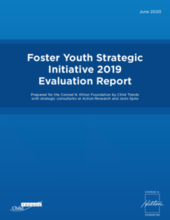Displaying 331 - 340 of 2221
The objective of this Agreement is to overcome the entrenched inequality faced by too many Aboriginal and Torres Strait Islander people so that their life outcomes are equal to all Australians. Target 12 of this Agreement is to "by 2031, reduce the rate of over-representation of Aboriginal and Torres Strait Islander children in out-of-home care by 45 per cent."
The present study analysed associations between threat and deprivation exposure and different facets of emotion understanding in a sample of maltreated children in foster care.
The present study analysed associations between threat and deprivation exposure and different facets of emotion understanding in a sample of maltreated children in foster care.
The aim of this study was to describe the language and literacy profiles of adolescents (aged 13–19) in out-of-home care (‘looked after children’) in Australia.
This report summarizes some of the major accomplishments, challenges, and lessons learned from the Foster Youth Strategic Initiative, which aimed to ensure that older youth in foster care in Los Angeles County (LA) and New York City (NYC) become self-sufficient and thriving adults.
The authors of this article sought to better understand the relationship between homelessness and child welfare services (CWS) involvement and examine whether homeless shelter data could combine with CWS data to enhance intervention targeting.
The goals of this article were to (a) examine the changes in educational achievements of children in care from preschool through the end of primary school; (b) identify subgroups exhibiting distinct educational trajectories; and (c) explore key predictive individual, care, and school characteristics.
This brief article from Student Affairs Today highlights some of the lessons learned by student affairs professionals regarding foster care support programs at higher education institutions in the United States in light of the COVID-19 crisis.
This paper explores within group differences for Mexican and Puerto Rican mothers vulnerable to child welfare involvement.
This study aims to answer two research questions: a) How do youth and staff/professionals define/conceptualize authentic youth engagement (AYE)? and b) What are youths’ and staff/professionals’ recommended strategies for authentically engaging youth?



